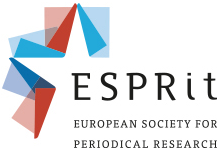JEPS 5.1 (2020): What is Popular? Studies on the Press in Inter-War Europe
Special issue of the Journal of European Periodical Studies Vol 5 No 1 (2020): Vol 5 No 1 (2020): What is Popular? Studies on the Press in Inter-War Europe
Guest-edited by Fabio Guidali and Gioula Koutsopanagou.
Table of Contents
ARTICLES
Gioula Koutsopanagou, What is Popular? Studies on the Press in Interwar Europe: Popular Print as Historical Artefact
Martin Conboy, Aligning the Newspaper and the People: Defining the Popular in the British Press
Irene Piazzoni, Shaping a Weekly ‘For Everyone’: Italian Rotocalchi Entre-Deux-Guerres
24–42
Enrico Landoni, Propaganda and Information Serving the Italian Sports Movement: The Case of the Periodical Lo Sport Fascista (1928‒43)
Victoria Kuttainen, Books, Films, and Phonographs: Australian Interwar Magazines and the Intermediation of Historical New Media
James Whitworth, Visual Humour and the Pocket Cartoon: Osbert Lancaster and a Paradigm Shift in the British Press in the Interwar Years
Nicole Immig, Greek Illustrated Journals and the ‘Popular’ (1912‒24): In Quest for a New Research Approach
Fabio Guidali, Afterword: In the Eye of the Beholder? A Proposal for a Popular Culture Artefacts Checklist
REVIEWS
Andrew D. Hoyt, Review of Paolo Giovannetti, ed., Periodici del Novecento e del Duemila fra Avanguardie e Postmoderno (2018)
Fauve Vandenberghe, Review of Jennie Batchelor and Manushag N. Powell, eds, Women’s Periodicals and Print Culture in Britain, 1690–1820s (2018)
JEPS 4.1 (2019): Periodicals In-Between/Les Périodiques comme médiateurs
Special issue of the Journal of European Periodical Studies Vol 4 No 2 (2019): Periodicals In-Between/Les Périodiques comme médiateurs
Guest-edited by Evanghelia Stead.
Table of Contents
SPECIAL ISSUE
Evanghelia Stead, Periodicals In-Between / Les Périodiques comme médiateurs
Alain Vaillant, La littérature, entre livre et périodique (19e–21e siècles)
Laurel Brake, Writing the Contemporary in the Periodical Press: Art and News 1893–1906
Béatrice Joyeux-Prunel, Internationalization through the Lens: Nineteenth- and Twentieth-Century Art Periodicals and Decentred Circulation
Poppy Sfakianaki, La revue Verve (1937–60): Un tremplin pour la carrière de Tériade dans les éditions d’art
Dounia Badini, Le Jeudi de la revue libanaise Shi‘r (1957–70): Un canal de médiologie du projet moderniste de Yûsuf al-Khâl (1917–87)
Fabio Guidali, Developing Middlebrow Culture in Fascist Italy: The Case of Rizzoli’s Illustrated Magazines
Marie-Ève Thérenty, L’esprit Gallimard: Stratégies médiatiques et dispositifs éditoriaux de Détective, Voilà et Marianne (1928–40)
ARTICLES
Charlotte D’Eer, Expanding Transnational Networks: The Impact of Internal Conflict on the Feminist Press in Dokumente der Frauen (1899–1902) and Neues Frauenleben (1902–17)
REVIEWS
Rio Matchett, Review of Catherine Clay, Time and Tide: The Feminist and Cultural Politics of a Modern Magazine (2018)
Nissa Ren Cannon, Review of Patrick Collier, Modern Print Artefacts: Textual Materiality and Literary Value in British Print Culture, 1890–1930s (2016)
Jolien Gijbels, Review of Megan Coyer, Literature and Medicine in the Nineteenth-Century Periodical Press: Blackwood’s Edinburgh Magazine, 1817–1858 (2017)
New Book: Paolo Giovannetti (ed.), Periodici del Novecento e del Duemila fra avanguardie e postmoderno (Mimesis, 2018)
ESPRit is pleased to inform you of the publication of Periodici del Novecento e del Duemila fra avanguardie e postmoderno, an Italian-language volume edited by prof. Paolo Giovannetti in the context of his research project "Twentieth and Twenty-First Century Periodicals: Between the Avant-Gardes and Postmodernism." Below is a short description of this publication:
The volume aims to provide a contribution to research in the field of periodical studies. As a recently defined field, the historical-theoretical study of periodicals implies multidisciplinary competences that bring together specific areas such as literature, linguistics, philosophy, law, science, as well as librarianship and archiving. It also involves different approaches, from the historical approach (history of the press, history of journalism, history of art, etc.) to the semiotic one (visual and media studies). The periodical field thus identified allows many issues to be reconsidered in an innovative way: in literature, for instance, it prompts a re-reading of national canons and assumed categories such as avant-garde, modernism, postmodernism.
Our best congratulations to prof. Giovannetti and to the volume's contributors!
New Book: Investigating Conflict Discourses in the Periodical Press
Now out: Garzone, G.; Logaldo, M.; Santulli, F. (eds.) 2020. Investigating Conflict Discourses in the Periodical Press. Bern/New York: Peter Lang.
The contributions collected in this book deal with the representation of conflict in the periodical press, which has often been an arena of adversarial stances, staged and enacted either within the same publication or enlarged to involve various newspapers and magazines in a series of provocations and replies. Underlying all the contributions is the awareness that the periodical press provides an ideal terrain for research on the discursive representation of conflict, having the prerogative to combine insight with a constant updating of the debate. The issue is approached in an interdisciplinary perspective, bringing linguistics and discourse analysis with Periodical Studies, hence highlighting the connection between language and ideology. The focus on lexical choices and rhetorical devices used to tackle current controversial issues such as Brexit, immigration, violence in sports, policies regarding health and food, women’s role and legal matters ultimately transcends national boundaries to become more widely representative of today’s discourses of conflict.
This volume is the outcome of the papers presented by linguists at the 6th ESPRit conference held in Milan in 2017. For more information, please visit the website of the publisher, www.peterlang.com.
